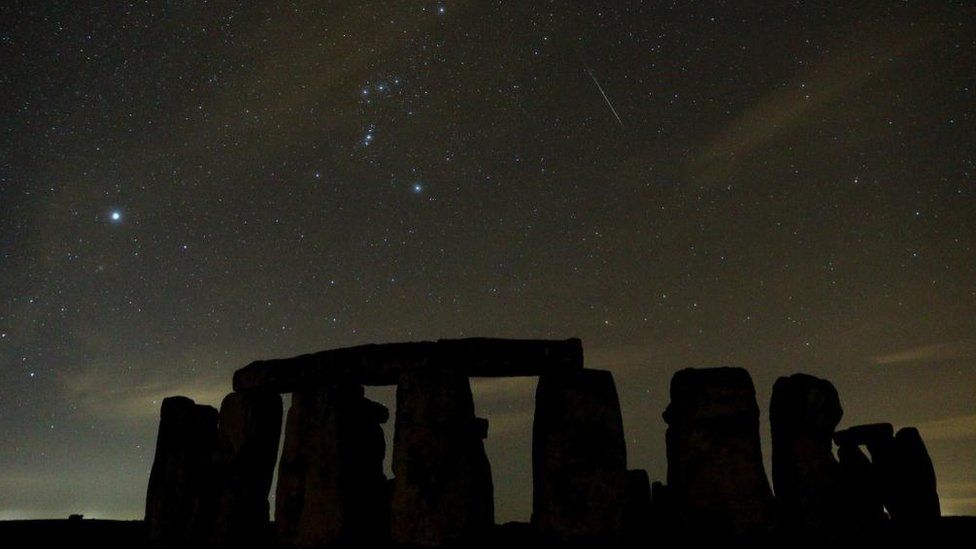Geminid meteor shower lights up night sky
- Published

The Geminids can be seen each year in mid-December
The Geminids meteor shower, famous for its multicoloured streaks of light across the night sky, has wowed stargazers across the globe.
Visible around the world, the meteors can be seen with the naked eye as long as the sky isn't too cloudy or affected by light pollution.
In perfect conditions, viewers can spot dozens of meteors every hour.
Nasa calls the Geminids one of the year's "best and most reliable annual meteor showers".
The meteor shower could be seen over St Aldhelm's Chapel in Dorset
Geminid meteor shower seen near Hay-on-Wye, Wales
What exactly causes these showers?
We see meteors when the Earth passes through trails of debris from comets or asteroids. As that debris hits our planet's atmosphere, it burns up and creates spectacular streaks of light.
The Geminids are triggered by celestial debris left behind by a rocky asteroid known as 3200 Phaethon.
"Shooting stars actually have nothing to do with stars," according to Dr Maggie Aderin-Pocock, space scientist and co-host of The Sky at Night. "It's just these tiny bits of debris sort of burning up" she said.
The Geminid meteor shower was seen in Elham, Kent
The meteor shower was seen in Hampshire
Dr Aderin-Pocock said that because this meteor shower is caused by an asteroid and not a comet, it makes it "quite spectacular because asteroids are rocky" whereas comets are icy.
"Quite a few of these shooting stars will be coloured because of the difference in elements within the particles," she said.
The Royal Observatory in Greenwich says the colours include white, yellow, green, red and blue. The colours are partly caused by the presence of traces of metals like sodium and calcium in the debris.
The shower was seen in the skies above Buddo Rock near Boarhills in Scotland
The name Geminids comes from Gemini, the constellation where these meteors appear to emerge from.
"This meteor shower is just a beautiful night sky event where many shooting stars seem to come from the same area in the sky," said Dr Minjae Kim, an astronomy and astrophysics research fellow at the University of Warwick.
How can you see the Geminids?
Dr Aderin-Pocock explained that the best way to see meteors is to just look up at the sky, adding that while "you don't actually have to look towards Gemini, you might see more if you do."
"So if you find Orion, look slightly to your left, and you should see Gemini and that's where these shooting stars will be emerging from," Dr Aderin-Pocock said.
You won't need any special equipment to view the shower and it might be easier to see them with just the naked eye.
It's also a good idea to go to as dark an open space as possible, as light pollution in cities can ruin the view.
While the display has been visible for a few days already, the meteor shower peaked on Thursday night.
Don't worry if you didn't manage to see the Geminids during their peak as the showers continue for a few days, though in lesser numbers.
Dr Kim suggested downloading a stargazing app to help you know where to look.
"If you can find the Gemini constellation first, it's a piece of cake to see the meteor shower," he says.
You should be able to see the meteors with a naked eye - if the weather is good
Other tips from Dr Kim include giving your eyes time to adjust to the dark, and taking a friend along - that way you can keep your eyes on different parts of the sky.
BBC Weather presenter Simon King said there were enough cloud breaks on Thursday night for people across the UK to spot the meteor shower.
"On Friday night it's going to be overcast for most of the UK with the exception being in eastern England where there'll be clear skies.
"Saturday night isn't looking good with overcast skies across the UK but then Sunday night is perhaps the better chance for many.
"Clear skies are expected at least for a time across England and Wales, especially southern and eastern areas."